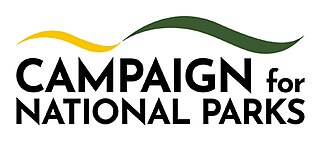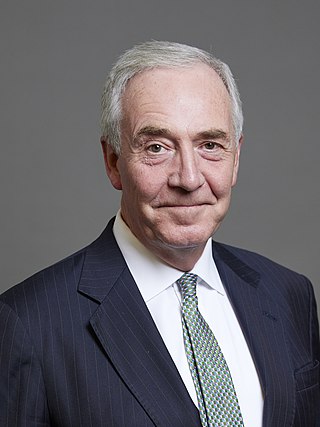
David Charles Waddington, Baron Waddington, was a British politician and barrister.
In the United Kingdom, representative peers were those peers elected by the members of the Peerage of Scotland and the Peerage of Ireland to sit in the British House of Lords. Until 1999, all members of the Peerage of England held the right to sit in the House of Lords; they did not elect a limited group of representatives. All peers who were created after 1707 as Peers of Great Britain and after 1801 as Peers of the United Kingdom held the same right to sit in the House of Lords.

Campaign for National Parks (CNP) – formerly the Council for National Parks and the Standing Committee on National Parks – is an independent UK registered charity promoting the National Parks of England and Wales for the public benefit.

The Children Act 1989 is an Act of Parliament of the United Kingdom that received royal assent on 16 November 1989 and came into substantial force across all three jurisdictions of the United Kingdom on 14 October 1991. In 1995, for the purposes of devolution, the Act was replaced by parallel legislation in Scotland and Northern Ireland. And in 2016, Part III of the Act was replaced in Wales.

During British Summer Time (BST), civil time in the United Kingdom is advanced one hour forward of Greenwich Mean Time (GMT), in effect changing the time zone from UTC±00:00 to UTC+01:00, so that mornings have one hour less daylight, and evenings one hour more.

Anthony Paul Lester, Baron Lester of Herne Hill, QC was a British barrister and member of the House of Lords. He was at different times a member of the Labour Party, Social Democratic Party and the Liberal Democrats. Lester was best known for his influence on race relations legislation in the United Kingdom and as a founder-member of groups such as the Institute of Race Relations, the Campaign Against Racial Discrimination and the Runnymede Trust. Lester was also a prominent figure in promoting birth control and abortion through the Family Planning Association, particularly in Northern Ireland.

The Legislative and Regulatory Reform Act 2006 (LRRA) is an Act of the Parliament of the United Kingdom. It was enacted to replace the Regulatory Reform Act 2001 (RRA). The Act was and remains very controversial, because of a perception that it is an Enabling Act substantially removing the ancient British constitutional restriction on the Executive introducing and altering laws without assent or scrutiny by Parliament, and it has been called the "Abolition of Parliament Act".

The Sexual Offences Act 1967 is an act of Parliament in the United Kingdom. It legalised homosexual acts in England and Wales, on the condition that they were consensual, in private and between two men who had attained the age of 21. The law was extended to Scotland by the Criminal Justice (Scotland) Act 1980 and to Northern Ireland by the Homosexual Offences Order 1982.

The Climate Change Act 2008 is an Act of the Parliament of the United Kingdom. The Act makes it the duty of the Secretary of State to ensure that the net UK carbon account for all six Kyoto greenhouse gases for the year 2050 is at least 100% lower than the 1990 baseline, toward avoiding dangerous climate change. The Act aims to enable the United Kingdom to become a low-carbon economy and gives ministers powers to introduce the measures necessary to achieve a range of greenhouse gas reduction targets. An independent Committee on Climate Change was created under the Act to provide advice to UK Government on these targets and related policies. In the act Secretary of State refers to the Secretary of State for Energy and Climate Change.

The State of Malta, commonly known as Malta, was the predecessor to the modern-day Republic of Malta. It existed between 21 September 1964 and 13 December 1974.

An Act of Parliament in the United Kingdom is primary legislation passed by the UK Parliament in Westminster, London.

Christopher Holmes, Baron Holmes of Richmond,, is a British former swimmer and life peer in the House of Lords. He won a total of nine gold, five silver, and one bronze medal at the Paralympic Games. Holmes represented Great Britain at four Paralympic Games between 1988 and 2000 and is the only British Paralympic swimmer to win six gold medals at a single Games.

Ian McColl, Baron McColl of Dulwich, is a British surgeon, professor, politician and Conservative member of the House of Lords. McColl was made a life peer for his work for disabled people in the Queen's Birthday Honours in 1989, which was gazetted on 29 July 1989 with the style and title of Baron McColl of Dulwich, of Bermondsey in the London Borough of Southwark. He was Parliamentary Private Secretary to Prime Minister John Major from 1994 to 1997 for which he was appointed a Commander of the Order of the British Empire (CBE) in 1997.

Local and personal acts are laws in the United Kingdom which apply to a particular individual or group of individuals, or corporate entity. This contrasts with a public general Act of Parliament (statute) which applies to the nation-state. Acts of Parliament can afford relief from another law; grant a unique benefit or, grant powers not available under the general law; or, relieve someone from legal responsibility for some allegedly wrongful act.

The Parliamentary Voting System and Constituencies Act 2011(c. 1) is an Act of the Parliament of the United Kingdom that made provision for the holding of a referendum on whether to introduce the Alternative Vote system in all future general elections to the UK Parliament and also made provision on the number and size of parliamentary constituencies. The Bill for the Act was introduced to the House of Commons on 22 July 2010 and passed third reading on 2 November by 321 votes to 264. The House of Lords passed the Bill, with amendments, on 14 February 2011, and after some compromises between the two Houses on amendments, it received Royal Assent on 16 February 2011.

The Administration of Justice Act 1939 was an Act of the Parliament of the United Kingdom that modified the law in England and Wales with regards to juries in England and Wales.

The European Union (Withdrawal) Act 2018 is an Act of the Parliament of the United Kingdom to repeal the European Communities Act 1972, and for parliamentary approval to be required for any withdrawal agreement negotiated between the Government of the United Kingdom and the European Union. Initially proposed as the Great Repeal Bill, its passage through both Houses of Parliament was completed on 20 June 2018 and it became law by Royal Assent on 26 June.

The European Union Act 2017 was an Act of the Parliament of the United Kingdom to empower the Prime Minister to give to the Council of the European Union the formal notice – required by Article 50 of the Treaty on European Union – for starting negotiations for the United Kingdom's withdrawal from the European Union. It was passed following the result of the 2016 United Kingdom European Union membership referendum held on 23 June in which 51.9% of voters voted to leave the European Union.

David William Kinloch Anderson, Baron Anderson of Ipswich, is a British barrister and life peer, who was the Independent Reviewer of Terrorism Legislation in the United Kingdom between 2011 and 2017. On 8 June 2018 it was announced that he would be introduced to the House of Lords as a cross-bench (non-party) working peer. On the same day he was appointed a Knight Commander of the Order of the British Empire (KBE), for services to national security and civil liberties, in the Queen's 2018 Birthday Honours.

The Secure Tenancies Act 2018 is an Act of the Parliament of the United Kingdom. The act allows secure tenancies to be given to victims of domestic abuse. It was introduced to Parliament as a government bill by Sajid Javid and Lord Bourne of Aberystwyth of the Department for Communities and Local Government.












